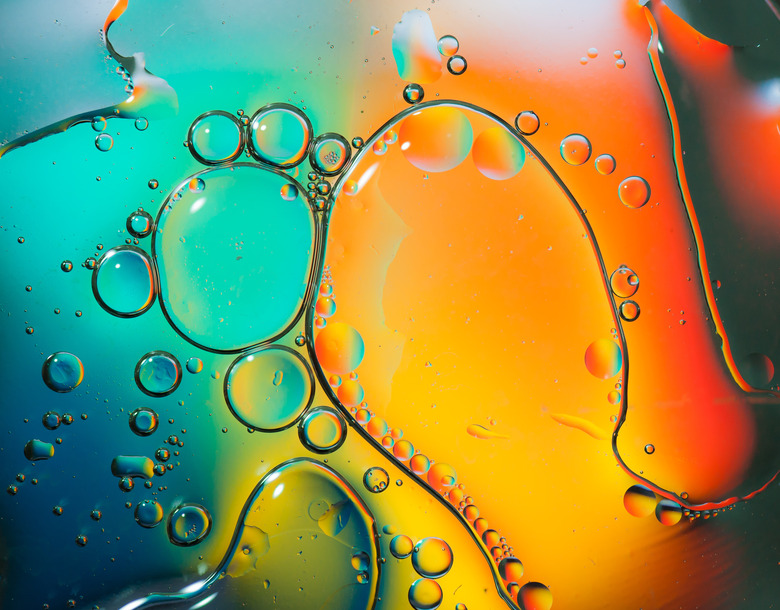Substances That Won't Dissolve In Water
Water is a solvent, meaning it is a liquid that dissolves substances. Any substance that dissolves is called the solute, and the mixture created when the solvent and solute completely combine and do not separate is called a solution. Water may be known as the "universal solvent" because it dissolves more substances than any other liquid, but some things won't ever dissolve in water.
TL;DR (Too Long; Didn't Read)
Many substances will not dissolve in water, including oil, paraffin wax and sand. Substances that do dissolve in water won't dissolve any further once they reach saturation point.
Relative Strengths of Attractive Forces
Whether or not a substance dissolves in a solvent – whether that is water or something else – depends on the strengths of their attractive forces, meaning the strength of the attraction between the solute particles, the strength of the attraction between the solvent particles, and the strengths between the solute particles and the solvent particles. For example, glucose, the basic form of sugar, dissolves in water because the attractive force between water and glucose is stronger than the attractive force between water and water or the attractive force between glucose and glucose.
Density and Dissolution
When two liquids combine to form a solution, they are called "miscible." If they can't be combined, they are called "immiscible." One example of this is oil (made from hydrogen and carbon) and water, which is the basis of the proverb, "Oil and water don't mix." If you try to mix water and oil, the oil always floats to the top because it is denser than water, and those oil droplets will never dissolve in water.
Polar Molecules
Water molecules are polar, meaning the atoms are arranged so that a positive charge is on one side of the molecule, and a negative charge is on the other side. Polar molecules are more attracted to molecules that are also polar or that have a charge, like an ion. If something with non-polar molecules is put into water, it won't dissolve. This explains the chemistry rule of thumb "like dissolves like." A perfect example of this is paraffin wax and water. If you put a lump of paraffin wax, which consists of many carbon and hydrogen bonds, into water, it remains as a lump. Even if you crush the wax up into little pieces and stir it around in the water, it still won't dissolve. This is because water is polar and the wax is non-polar.
Dissolving, Eroding and Suspending
Dissolving, eroding and suspending are all different reactions to contact with a liquid, and they should not be confused. Sand does not dissolve in water because the attractive force between water and water is stronger than the attractive force between water and the molecules that make up sand. If you stir sand into water, the water will go dark and cloudy as the sand becomes suspended in the water, but the sand won't dissolve. When you stop stirring, the sand will gradually sink to the bottom of the water, leaving clear water at the top. Rock that's been exposed to water for many years may appear to have partially dissolved, but it hasn't; it has eroded, instead. Running water makes minute particles wear off the surface of the rock. Erosion can happen to many surfaces, including loose topsoil, mud and more. The water carries the eroded material away to other bodies of water like lakes, streams and reservoirs, where the material settles to form mud or sediment.
Saturation and Dissolution
A solute that normally dissolves in water, like sugar or salt, won't continue to dissolve once it reaches saturation point. This is when the maximum amount of the solute has been dissolved into the water. The solution is at equilibrium, as the rate of dissolution and the rate of reforming the solid solute are equal. If you add more solute, the concentration of the solution won't change. You will simply get an accumulation of undissolved solid at the bottom of the solution.
Cite This Article
MLA
Gillespie, Claire. "Substances That Won't Dissolve In Water" sciencing.com, https://www.sciencing.com/substances-wont-dissolve-water-12013209/. 27 April 2018.
APA
Gillespie, Claire. (2018, April 27). Substances That Won't Dissolve In Water. sciencing.com. Retrieved from https://www.sciencing.com/substances-wont-dissolve-water-12013209/
Chicago
Gillespie, Claire. Substances That Won't Dissolve In Water last modified March 24, 2022. https://www.sciencing.com/substances-wont-dissolve-water-12013209/
